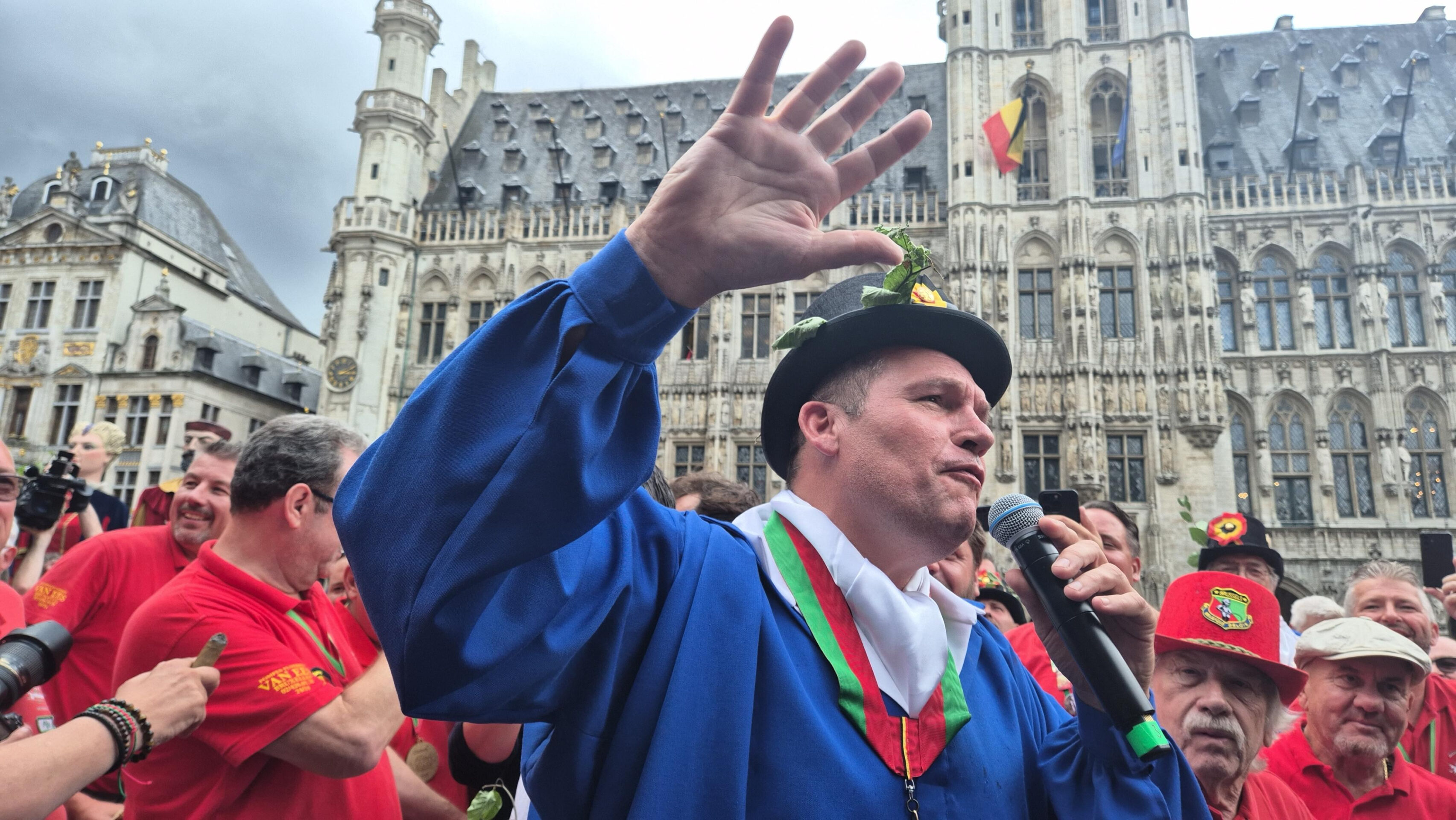Summer in Belgium is a period of calm. As tools are laid to rest and the country’s six parliaments take annual leave, July and August are a chance to ease off a bit. Less so for Brussels Mayor Philippe Close, who gazes excitedly over the sunny panorama from his top-floor office.
“Brussels comes alive in summer,” he enthuses as we discuss this season’s highlights – events such as Meyboom and the Flower Carpet. Though a vacation stillness settles over some neighbourhoods, “downtown” becomes a venue for a busy schedule of activities aimed at tourists and those residents who stay around.
Visibly energised by the prospect of holiday festivities, the Mayor has much more than concerts and carnivals to keep him occupied. Though fresh-faced and effusive, Close bears a burden of responsibility that extends to more serious matters of public safety, urban regeneration, and civic cohesion.
“My guiding vision is to make sure that Brussels thrives,” he explains, putting his commitment to the people of Brussels over national politics. It’s a mission he assumes with relish, choosing to run for a second term as Mayor of the City of Brussels rather than take up a position in federal policy-making. Looking ahead to the municipal elections in October, Close favours his chances for re-election: “People have shown their confidence in me. The only seat PS won was mine.”
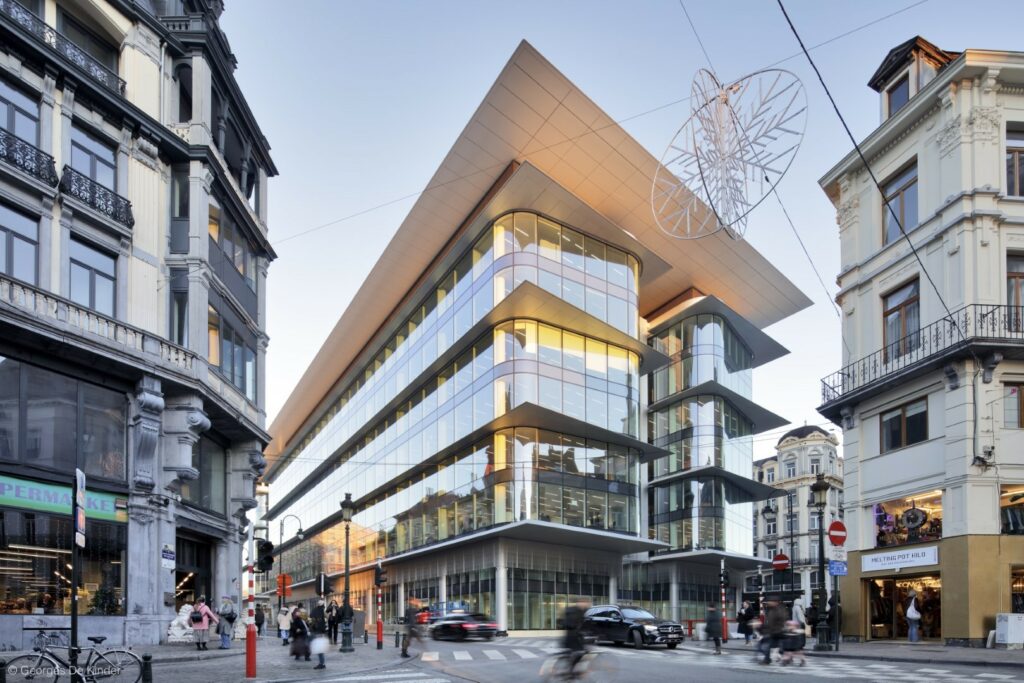
The new City administration building Brucity. Credit: Belga
Now 53, Close was born in Namur and studied at the Free University of Brussels (ULB). He became spokesman to Elio DiRupo, then-leader of francophone Socialist Party (PS), in 2000, before being elected to both the Brussels city council (2006) and the Brussels regional parliament (2009). He became Brussels mayor in 2017 following the resignation of his scandal-ridden PS colleague Yvan Mayeur.
Belgium’s political order is being reconfigured after the June elections pushed the nation to the right and dealt a historic blow to the Socialist Party (PS) of which Close is a member. In the French-speaking south of the country this was quite a rout, as the homeland for Belgian socialism turned from red to blue. Close concedes that the rise of the liberal Mouvement Réformateur (MR) was quite a surprise. But he remains upbeat about the outlook for Brussels, where the distribution of seats in the regional government means that MR will have to curb its most contentious designs for the city.
How Brussels moves
Most notable among the issues that fire political debate in Brussels is Good Move, a far-reaching project that attempts to reconfigure how people navigate the city. Under its auspices, cars have been channelled away from the city centre to open up space for pedestrians and encourage other forms of soft mobility. Whilst the changes have made parts of Brussels more verdant, reduced noise and air pollution, and boosted local business, the new circulation plan was not without opposition – in some cases sparking mobs of angry residents tearing down the new traffic signs.
MR leapt on the discontent, framing the issue as a battle between enterprising locals trying to get along and officious urban professionals pushing a programme of gentrification. The party’s leader Georges-Louis Bouchez kicked up a furore when he told reporters he intended to “bury Good Move”. Quite at ease riling up coalition partners, he accused the Dutch-speaking Greens in the Brussels government of “holding Brussels hostage” with an anti-car campaign. Bouchez himself lives in Mons, 50 kilometres south of Brussels. He likes to drive rally cars in his spare time.
Questioned on the quarrel, Close remains measured. “Bouchez doesn’t understand Brussels. He just makes loud statements. I’ll wait until MR formulate some actual proposals.”
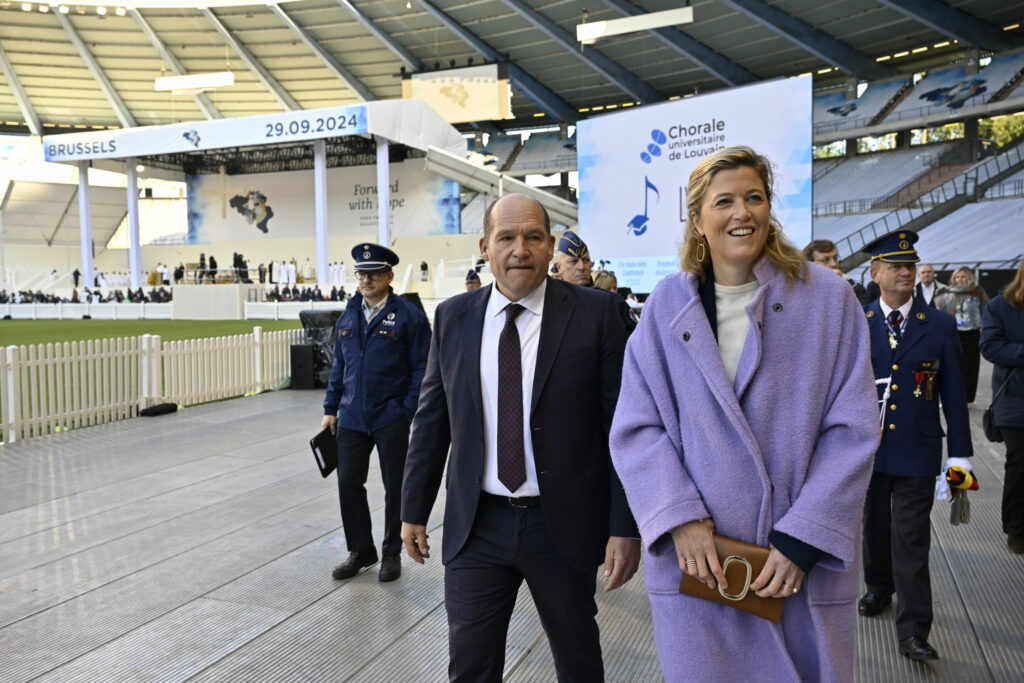
Philippe Close and Federal Minister Annelies Verlinden attend a holy mass at the King Baudouin Stadium in Brussels on Sunday 29 September 2024. Credit: Belga
Though eager to steer clear of political slanging contests, the Mayor is an unabashed evangelist for public transport and praises the regional network operator STIB as a public company that delivers. The city’s prosperity is to a large extent dependent on connectivity and Close is adamant that investment in this area must continue. He recognises the strength of opinion that Good Move stirs up – “The name has been tarnished. It makes people far too touchy.” – but says it has been misrepresented.
“People are wrong to think of it as a mobility plan. Good Move is in fact a plan for public space.” It was initially conceived as the first phase of a grander “Good Living” project, a holistic scheme to regenerate large tracts of Brussels. To make a success of Good Move, the challenge is now to make it look good: get rid of the concrete roadblocks and temporary road signs and attract the private investment that will follow once the streets have been smartened up. Already along the central Boulevard Anspach, Close says €1 billion has been spent by businesses eager to set up shop in the renovated car-free zone. If Good Move was the first step in expunging decades of dirt, Brussels must now push ahead with the full facelift.
Roadworks and raves
The Belgian capital is often mocked for the glacial speed at which public space and monuments are redeveloped. This is epitomised by the scaffolding that has shrouded the Palais de Justice for 40 years. But all around the city seems to be in a constant state of construction. The walk between Midi Station and North Station presents a 3km to-do list that will keep town planners busy for decades. And that’s if they can find the money – a massive €4.7 billion – to complete Metro 3.
Close prefers to highlight more modest victories. “Look at Porte de Ninove, that’s a mobility redesign carried to its completion. We’ve created a magnificent public space by shifting the main roads. There is a park that locals love and a tram linking it all together. This should be an example for other Good Move projects.”
Clearly determined that the city is changing for the better, Close addresses another critique he has sought to dispel during his term in office. “When I started out, TripAdvisor ranked Brussels one of the most boring cities in the world. You don’t hear that anymore.” The Mayor has thrown himself behind concepts to make culture accessible, most spectacularly by authorising “open-airs” – parties in public spaces. “There is an amazing appetite for these events. And young people have the right to have a good time.”
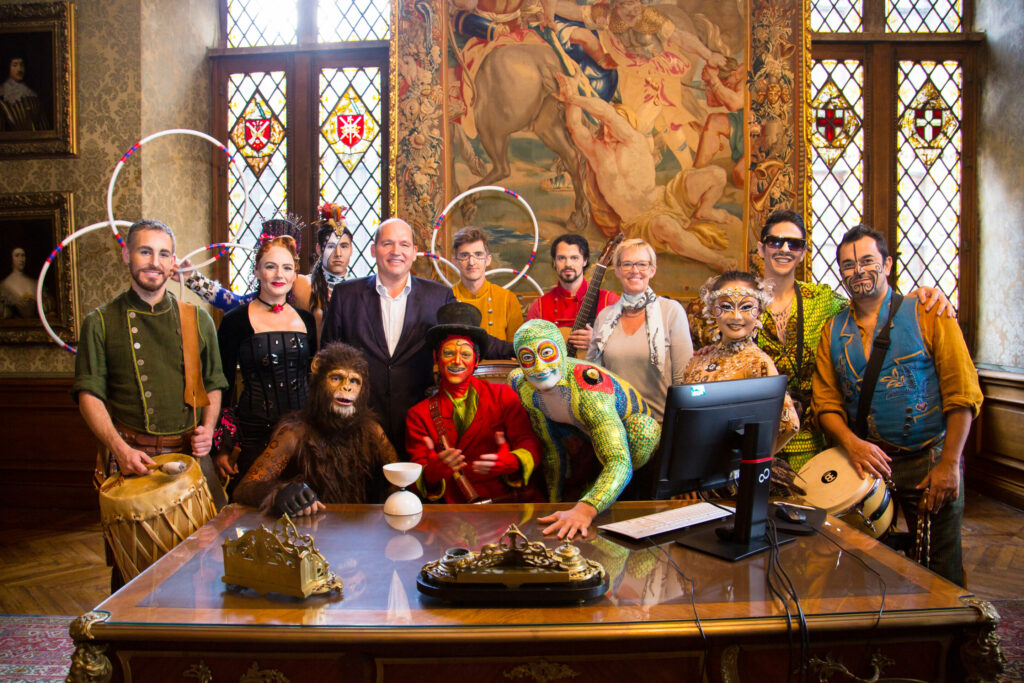
“When I started out, TripAdvisor ranked Brussels one of the most boring cities in the world. You don’t hear that anymore.” Cirques du Soleil artists meet Philippe Close. Credit: Belga
Close is a vocal champion of the arts and recognises the music scene in Brussels as one of its greatest assets: “Brussels is a party destination.” With his blessing, “raves” have been held in the road tunnels under Louise, in the Central Station, and on Place Poelaert. The minor inconveniences are paid back by the cash injection these bring to the local economy.
Noteworthy triumphs were a New Year’s party in the vast Brussels Expo centre beside the Atomium (36,000 people) and a push to capture some of the revenue from Tomorrowland –the biggest electronic music festival in Europe. Close actively campaigned for festivalgoers to make a trip to Brussels as well, hosting a party for attendees on the Grand Place. He calculates that Tomorrowland tourism led to an extra 60,000 nights being booked in Brussels hotels.
Keeping the local balance
But is Brussels going too far in its bid to win tourists? City authorities have leaned heavily on Belgian stereotypes to bring in sightseers. Belgian Beer World – a tribute to the country’s brewing expertise opened in the renovated Bourse stock exchange – has been described by detractors as a prestige project with a multi-million price tag for taxpayers. Adult tickets are €17 (inc. one 15cl taster), a price that many feel is too high. Visitor numbers often dip below 100 on weekdays. Can this really be called a success?
“It will take some time to get up to speed but we’ll get there, I’m not worried about that,” the Mayor maintains. Nor is there anything wrong with playing up the beer cliché: “It’s typically Belgian. The Irish are proud of their beer, they have the Guinness Storehouse. The Dutch are proud of their beer, they have the Heineken Experience. Why shouldn’t we be proud of Belgian beer?”
“It’s wrong to say that Brussels is becoming a Disneyland,” Close contends. He sees tourism as the obvious driver of prosperity in a densely built-up space – after all, “you can’t just build factories here.” Better, in his view, to harness the rich heritage of a city with plenty of things to do and no shortage of visitors thanks to the 1,500 international organisations that call Brussels home.
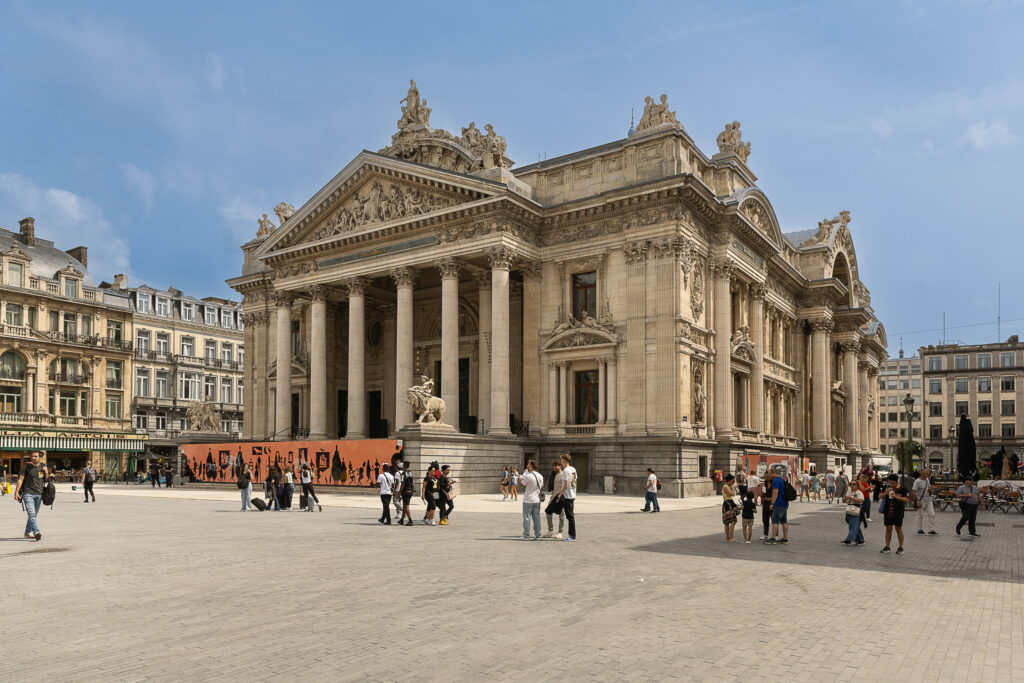
The renovated Bourse stock exchange building in the centre of Brussels. Credit: Belga
He cites Barcelona, which has recently seen outpourings of public anger against over-tourism: “The difference is that just 2% of housing in Barcelona is public. In Brussels it’s 20%.” This gives the City a much tighter grip on tourism and firm steps have already been taken to restrain platforms like Airbnb.
Close is convinced that a burgeoning tourism sector is compatible with improving living standards for locals. Proof of this is in the renewed popularity of Bruxelles 1000 as a place to live. Once seen by Belgians as a quartier défavorisé, today it is a place people want to live. “20 years ago the city centre had 135,000 inhabitants; today we’re approaching 200,000.” Close sees this as validation that tourism, commerce, and local life can go hand in hand. He alludes to his 2018 programme, which aimed to create a “10-minute city” – not the conspiracy theory of urban ghettos but a response to the needs of residents by improving connections and bringing essential amenities within reach.
Belgian capital, international heart
Brussels is much more than a weekend tourist destination or a convenient location for international institutions. Close is attentive to the needs of residents and sees education as the key to the city’s long-term prosperity. “We can’t invest too much in education. The goal is to make Brussels a city of knowledge.” He frequently uses the term “smart city”, by which he means raising standards in local education systems whilst also promoting the city’s university credentials to train new generations of highly qualified graduates. Given that Brussels is the “centre of international diplomacy”, it makes sense to couple this with the educational institutions that already cater to 140,000 students – many of them non-Belgians. Done right, Brussels would not only be HQ for global organisations, it would also produce the policymakers and public servants of tomorrow.
Alongside nurturing homegrown talent, Close is full of praise for the prominent international community. He often refers with pride to the 184 nationalities that reside here. For him, Brussels incarnates a healthy multiculturalism: “It’s expats who make this city great.” More than one in three people living here are not Belgian, making it a city of many faces but where none claims cultural hegemony. All the same, there is among many a lack of engagement with local affairs. He regrets that just 16% of expats participate in local elections, despite these being open to longer-term residents of Brussels. “It’s their city and my job is to engage them in the decision-making process.”
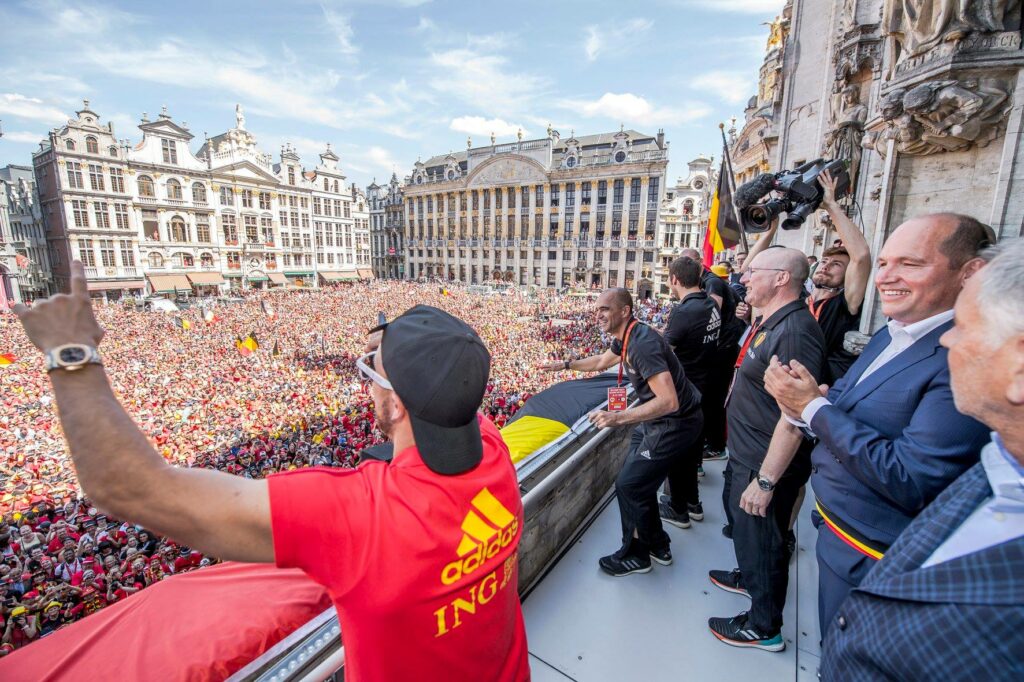
Celebrations on the Grand Place as crowds welcome the Red Devils home after reaching the 2018 World Cup semi-finals. Credit: Belga
The political awakening of Brussels isn’t a subsidiary concern; making the authentic voice of the capital’s residents heard on the national level is the only sure way to deliver a practical programme that works for the city. Brussels sits awkwardly in the Belgian narrative, caught between the two dominant language communities. Close is non-plussed by the periodic squabbling that casts Flanders and Wallonia as combatants. With the air of a weary parent he dismisses the disputes as an “idiotic competition” that completely overlooks the national interest. “It’s nonsensical for Belgium to have such a complex dynamic between the capital and regions. I spend a lot of time building bridges.”
Rising above regional differences requires Brussels to find its own voice. The city’s most strident standard-bearers accentuate its individualism. “We are a nonconformist city that embraces independence. Brussels is more than a city, it’s an attitude,” said Pascal Smet, former Secretary of State for International Relations. And though Brussels displays many of the peculiarities that newcomers put down as “typically Belgian” – from the round-about administrative procedures to the mosaic of facades – it is a mistake to take the capital as an amalgamation of Belgium’s French and Dutch speaking populations.
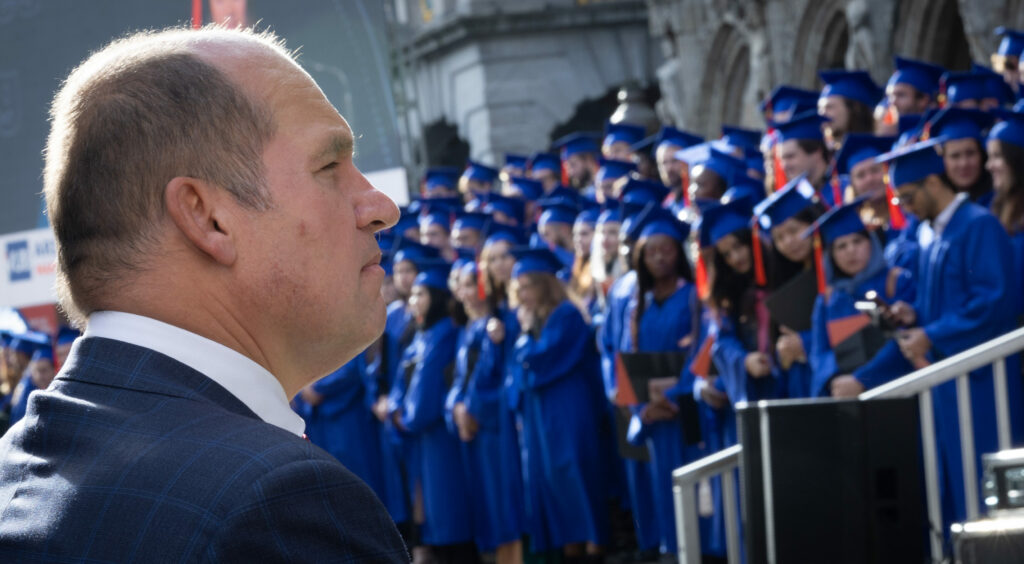
Close pictured during the graduation ceremony for students of the VUB and ULB universities on the Grand Place. Credit: Belga
Well aware of his city’s status as the second-most cosmopolitan city in the world (outdone only by Dubai), Close sees himself as a mediator on many fronts. He makes the Brussels case to the regions, EU institutions, cultural sectors, businesses, and security forces. “I’m in touch with everyone. Everyone can come to me,” he confirms. Knitting together the constituent parts is a huge work in progress. But Close is undeterred, eager to perpetuate the progress that has been made in relatively little time.
With local elections approaching, his focus is fixed on the future: “Belgium needs to look forward to what’s to come. For Brussels this is especially important. There is so much promise if we all move together.”

